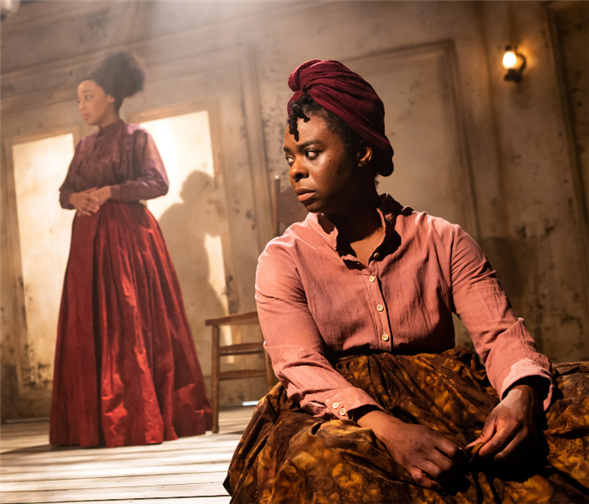Translate Page

An African-American critic calls for an end to endless suffering
---
As a theatre critic, I see wide variety of shows about a multitude of subjects. But as a black woman, I am constantly confronted by the fact that the art form I adore often does not honor the experiences of people who look like me. Of the dozens of shows I've seen over the past six months, I can think of only a handful that had black female characters, and they were all subservient roles.
Certainly there are exceptions to this rule. Crowns, Nina Simone: Four Women and Lady Day at Emerson's Bar & Grill come to mind, but they're all set in the past. On commercial American stages, strong, modern-day black women are all but absent.
By my count, over the past decade there have only been 30 shows with roles expressly written for black women on Broadway, and nearly half depict them as slaves or servants (Amazing Grace, Once on This Island, To Kill a Mockingbird, even the groundbreaking Eclipsed). Then there are the vintage bio musicals like Summer and Motown, suggesting that black women have to be glamorous and super-talented in order to be showcased. Meanwhile, Waitress, Mean Girls and Pretty Woman tell stories of ordinary white girls doing nothing in particular.
Latinx and Asian female characters are even scarcer on stage. According to the Asian American Performers Action Coalition's most recent report on ethnic representation on New York City stages, African-American actors were cast in 18.6% of all roles, Asian-American actors in 7.3% and Latinx actors in 5.1%. That doesn't even take gender or a character's ethnic identity into account, but the numbers still paint a stark picture. Even though African-American women may turn out ahead in terms of representation, we are often portrayed in the context of suffering.
As per the Broadway League's 2017-2018 Demographics of the Broadway Audience, 66% of theatregoers are women, and the majority of African-American theatregoers are women. So why do black female characters continue to be so tragic? African-American women have the highest college completion rate of any minority group and tend to be the primary breadwinners in their households. Today, black women are CEOs, gamers, athletes, chefs, entrepreneurs, surgeons, punk rockers, fashion icons and so much more. Why don't we see those types of black female characters? We urgently need a fuller narrative and some joy. When my mind floats to images of my black girlhood, I think of my mother who wore a suit to work everyday for 30 years, my godmother who ran a youth basketball league, my cousin whose beauty salon provided women with a safe space to laugh at dates gone awry, and a family friend who conducted research at the Centers for Disease Control. Why don't I see those ladies on stage?
Admittedly, Off-Broadway is a better destination for complex portrayals of African-American women. In Charly Evon Simpson's incredibly moving Behind the Sheet at Ensemble Studio Theatre, the slave women being experimented on by a myopic doctor manage to be funny and graceful despite their pain. Signature Theatre Company is producing a season of satires by Lynn Nottage centering on black women. Fabulation, or the Re-Education of Undine and the currently running By the Way, Meet Vera Stark feature boisterous and complicated protagonists, trying to overcome racism and sexism with intelligence and wit.
Still, even these plays depict black women suffering. Why must we always suffer? Where's the show about the black girl obsessed with Zelda who wakes up one day in the video game? Where's the play about the queer black girl who wins the beauty pageant? Where's the comedy about the compassionate black female CEO who cracks the glass ceiling? Everyone's waiting, because though our numbers are relatively small, our influence as tastemakers is vast -- just look at the prevalence of cornrows, kente cloth and twerking in pop culture. Witness the way we start and fortify social movements like #BlackLivesMatter, #MeToo and #BlackGirlMagic. When we say, "Yaaaaassss," the world listens and responds.
I want to see a Broadway show where the strong independent black woman isn't punished; where the black teenager gets to live and go to the prom; where the black lady is the lead, not the sidekick. I want to see her dance and sing without permission simply because it's Tuesday. This is how we live our lives. It's time we see that on stage.
---
Follow Kelundra Smith at @PieceofKay. Follow TDF at @TDFNYC.
Top image: Amber Reauchean Williams and Jehan O. Young in Behind the Sheet. Photo by Jeremy Daniel.
TDF MEMBERS: Go here to browse our latest discounts for dance, theatre and concerts.